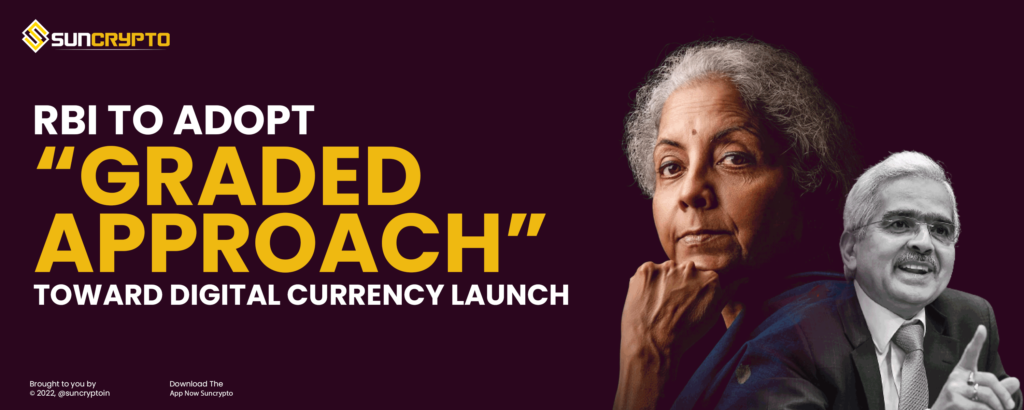In its annual report released on Friday, May 27, the Reserve Bank of India (RBI) stated that it would take a “graded approach” to the implementation of the Central Bank Digital Currency. It stated that the design of the central digital coin must be in line with the country’s monetary policy objectives, financial stability, and efficient currency and payment system operations. The RBI’s announcement comes months after it stated that it was in a position to begin testing and executing CBDC pilot programs.
The establishment of CBDC was announced in the Union Budget for 2022-23, and the Finance Bill for 2022 included an applicable change to the RBI Act, 1934. In its annual report, the RBI stated, “The Finance Bill, 2022, has been adopted, establishing a legislative basis for the introduction of CBDC.” Along with that RBI added to its statement that
The Reserve Bank offers a graded approach to CBDC implementation, moving through stages of Proof of Concept, pilots, and launch one by one.
Introduction to CBDC
Last year the RBI stated that “CBDC is a digital or virtual currency, but it is not similar to the private virtual currencies that have exploded in popularity over the last decade.” CBDC is a digital form of legal money issued by a central bank. It functions in the same way as fiat money and can be exchanged for fiat money in a one-to-one ratio.
CBDCs are being developed in a number of nations, and some have already implemented them. Because so many governments are looking into how to make the switch to digital currency. CBDCs’ major purpose is to provide privacy, transferability, ease, accessibility, and financial security to businesses and consumers. CBDCs could also minimize the expenses of maintaining a complicated financial system, lower cross-border transaction costs, and provide lower-cost options to people who currently use alternative money transfer methods.
What will be the approach?

The Reserve Bank of India has been weighing the benefits and drawbacks of introducing CBDC in India, according to the central bank.
“As a result, the suitable design aspects of CBDCs that could be implemented with little or no disturbance are being investigated,” the report stated.
While presenting the Union Budget 2022-23, India’s Finance Minister Nirmala Sitharaman disclosed the central bank’s plan to create a digital currency in February. The Finance Bill of 2022 contains an application revision to the RBI Act of 1934. The Finance Bill of 2022 was passed, establishing a legislative basis for the establishment of CBDC.
T. Rabi Sankar, a Deputy Governor of the Reserve Bank of India, indicated in April that central banks would implement a CBDC “in a very measured, graded fashion, assessing impact all along the line.”
Meanwhile, the Reserve Bank of India (RBI) has maintained its anti-crypto stance. Following the collapse of cryptocurrency terra (LUNA) and stablecoin Terra USD, Governor Shaktikanta Das issued a warning about investing in the crypto market last week (UST).
The central bank said in February that cryptocurrency poses a significant danger to India’s macroeconomic and financial stability. The deputy governor of the Reserve Bank of India also indicated that prohibiting cryptocurrency is “most appropriate” for India and that regulating is “futile.”
The mission behind this approach
India’s finance minister, Nirmala Sitharaman, unveiled the CBDC project on February 1, 2022, when she announced the Union Budget 2022. Central Bank Digital Currency (CBDC) will provide the digital economy with a significant boost. In addition, the digital currency will result in a more efficient and cost-effective currency management system. As a result, it is planned that the Reserve Bank of India issue a Digital Rupee beginning in 2022-23, based on blockchain and other technologies.”
Disclaimer: Crypto products and NFTs are unregulated and can be highly risky. There may be no regulatory recourse for any loss from such transactions. All content provided is for informational purposes only, and shall not be relied upon as financial/investment advice. Opinions shared, if any, are only shared for information and education purposes. Although the best efforts have been made to ensure all information is accurate and up to date, occasionally unintended errors or misprints may occur. We recommend you to please do your own research or consult an expert before making any investment decision. You may write to us at [email protected].





